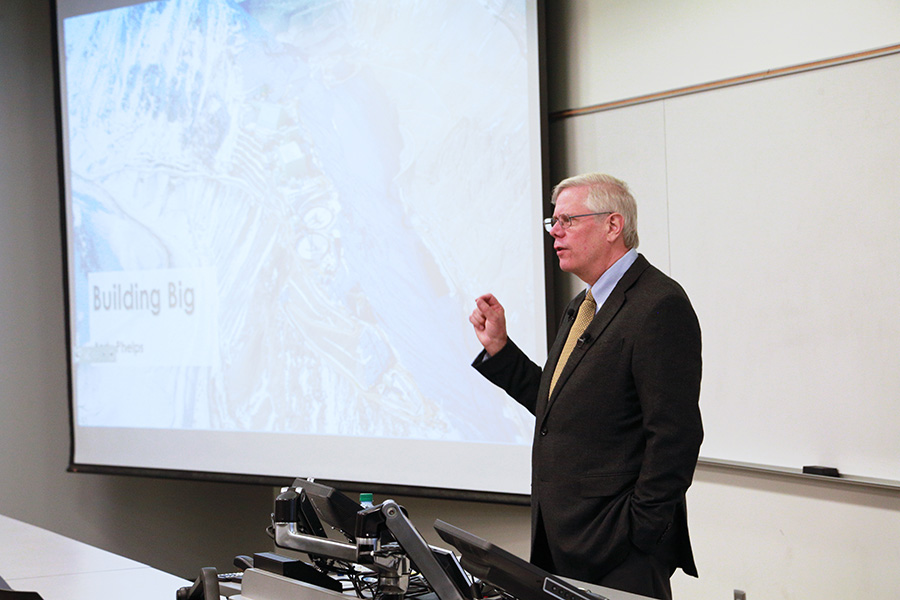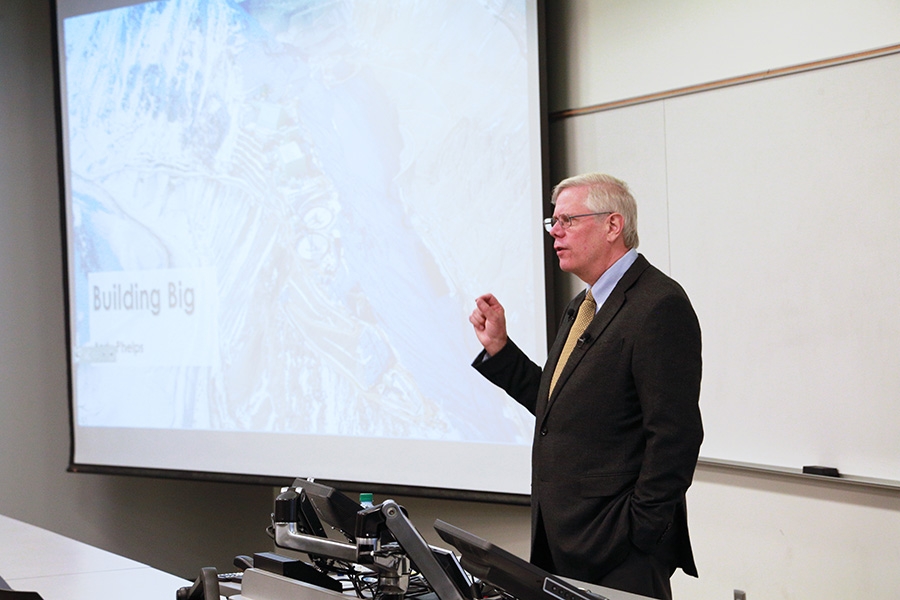 Andy Phelps delivers the fall 2017 lecture for the Hyatt Distinguished Alumni Leadership Speaker Series Oct. 3. Phelps retired in July as principal vice president of Bechtel Corp., where he oversaw construction megaprojects worth between $3 billion and $5 billion for the company's mining and metals division. (Photo by Zonglin "Jack" Li) |
Leadership is complicated — “squishy,” even — but the principles are simple, according to the fall 2017 Hyatt Distinguished Alumni Leadership Speaker. The hard part is applying those principles effectively.
From hard-won experience leading megaprojects worth $3 billion to $5 billion for Bechtel Corp. in remote corners of the globe, Andy Phelps shared advice and perspective with a room full of Georgia Tech students, faculty and alumni Oct. 3.
“[Leadership is] a complicated, squishy topic. It’s not like engineering, where you’ve got an equation to solve it,” said Phelps, who retired in July as principal vice president and global manager for operations of Bechtel’s mining and metals business. “It’s that soft side that’s so important in what we do.”
Phelps said leaders need to be open, honest and ethical in their dealings with employees and with customers. He said they need to build teams with a diversity of backgrounds, cultures and perspectives. And they need to take care of their people.
“All of us have times that we have needs or our families have needs, and we need to be respectful of that,” he said. “We need to help people go take those breaks.”
Phelps said he once had a project manager who needed a kidney transplant but was so committed to his work that he wasn’t going to take time off to get the new organ.
|
“I said, ‘You’re killing yourself. I’ll give you a choice: I will either fire you or I’ll give you a three month leave of absence to go take a break.’”
That point surfaced again when Phelps noted another key leadership trait: anticipating problems.
“Leaders need to be people that are looking for signs, they’re looking for signals that there are issues. They’re looking for those problems, anticipating them,” said Phelps, who earned his bachelor's in civil engineering from Georgia Tech in 1976. “They’re looking [out] for the health of their teams, their employees, caring about those things, and anticipating them.”
Part of heading off those problems, he said, is knowing when to ask for help.
“It’s cheating the team if you have a problem and you don’t raise it.”
Leaders also must empower the people they lead, he said.
“There’s a difference between delegating and empowering. Huge difference. Empowering means you trust the person to make a decision,” Phelps said.
|
“You’ve got to trust your team. That’s probably one of the most important things that you can do.”
Phelps said the projects he worked on often impacted the home country’s economic output directly — sometimes accounting for more than 10 percent of gross domestic product, or GDP. They were often what he called “bet the company” projects because of their size and impact.
For Phelps, that meant he had to find project managers who could endure enormous pressures.
“[I was] looking for leaders that have the confidence and the fortitude to stand toe-to-toe with governments and with customers and stand for what’s right — and have the background to be able to hold the line on cost and schedule,” Phelps said.
Phelps oversaw the design and construction of five copper concentrators, three aluminum smelters, one alumina refinery, one bauxite mine, one potash mine, and the world’s second-largest desalination plant in that role. He also helped lead the restructuring of the British nuclear industry and the Oak Ridge and Los Alamos national labs in the United States.
“I’ve just had an incredible career. I just feel very lucky at all the things I’ve gotten to do,” Phelps said. “I sometimes would be on a trip at a job and sort of pinch myself, saying, ‘Somebody’s paying me to do this? I would do this for free.’”

